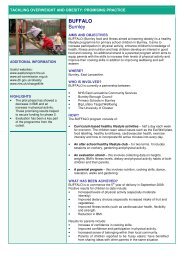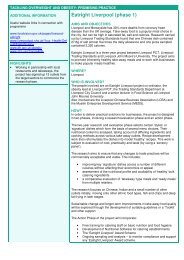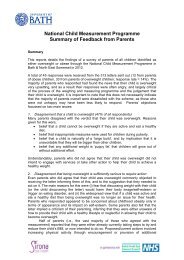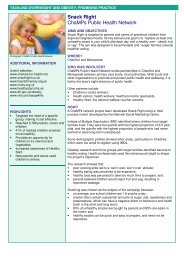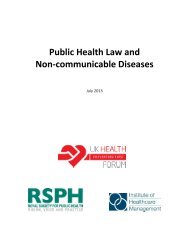The Challenge of Non-Communicable Diseases and Road Traffic ...
The Challenge of Non-Communicable Diseases and Road Traffic ...
The Challenge of Non-Communicable Diseases and Road Traffic ...
You also want an ePaper? Increase the reach of your titles
YUMPU automatically turns print PDFs into web optimized ePapers that Google loves.
An Overview 69<br />
nations <strong>of</strong> interventions <strong>and</strong> costs <strong>of</strong> new types <strong>of</strong><br />
community based services.<br />
Without research in clinical- <strong>and</strong> cost-effectiveness<br />
<strong>of</strong> NCD prevention interventions in SSA to<br />
guide <strong>and</strong> evaluate improvements, treatment <strong>and</strong><br />
prevention may be overly subject to the influence <strong>of</strong><br />
local <strong>and</strong> global commercial interests [482]. It can<br />
also be very useful to monitor <strong>and</strong> make public the<br />
activities in Africa <strong>of</strong> these global commercial interests,<br />
notably <strong>of</strong> the transnational manufacturers <strong>of</strong><br />
unhealthy commodities [483].<br />
For road safety, indispensable research would include<br />
assessment <strong>of</strong> knowledge, attitudes, <strong>and</strong> behaviors,<br />
<strong>and</strong> an evaluation <strong>of</strong> the effectiveness <strong>of</strong><br />
interventions [484]. Much knowledge <strong>and</strong> information<br />
is potentially transferable from existing studies<br />
elsewhere, given the similarity in contributory factors<br />
<strong>and</strong> that many motorized countries have undergone<br />
a similar developmental stage, taking into<br />
account cultural, economic, <strong>and</strong> social conditions in<br />
adapting successful experiences [63].<br />
Research in Africa needs to address broader social<br />
<strong>and</strong> cultural factors, as well as interventions.<br />
This means that research policy leaders must engage<br />
national governments <strong>and</strong> international agencies,<br />
service providers, <strong>and</strong> research communities [485].<br />
Multi-disciplinary, multi-institutional, <strong>and</strong> multi-country<br />
collaborations could conduct research<br />
<strong>and</strong> properly inform the design <strong>of</strong> interventions,<br />
working with health care providers, policymakers,<br />
NGOs, <strong>and</strong> communities to bridge the gap between<br />
research, practice, <strong>and</strong> policy [129, 179]. Investment<br />
in postgraduate training in chronic disease research<br />
is also needed to produce the next generation <strong>of</strong><br />
multidisciplinary researchers. Under country ownership,<br />
public-private research <strong>and</strong> training partnerships<br />
can result in country-wide workforce development<br />
[486]. <strong>The</strong>re is a growing recognition that<br />
current incentive systems fail to generate enough<br />
research <strong>and</strong> development to address the health care<br />
needs <strong>of</strong> developing countries <strong>and</strong> that global financing<br />
<strong>and</strong> coordination needs to be strengthened<br />
[487]. A promising model for ‘growing research’<br />
in developing countries is to use funding to link a<br />
developed country supervisor with a developing<br />
country supervisor for PhD students working in the<br />
developing country on local projects; this model is<br />
further strengthened if students from both settings<br />
work together in the developing country [488]. <strong>The</strong><br />
impact <strong>of</strong> all these efforts, however, would need to<br />
be rigorously measured.<br />
5.7 Role <strong>of</strong> Public <strong>and</strong> Private<br />
Employers <strong>and</strong> Businesses<br />
Public <strong>and</strong> private employers <strong>and</strong> businesses have an<br />
important role to play in addressing the socio-economic<br />
determinants <strong>of</strong> health. Indeed, their involvement<br />
could be particularly important in addressing<br />
the complex burden <strong>of</strong> disease in Africa. <strong>The</strong> poor<br />
health <strong>of</strong> employees quickly affects a company’s bottom<br />
line <strong>and</strong> has a longer-term impact on earnings<br />
<strong>and</strong> pr<strong>of</strong>its. Firms have a vested interest in supporting<br />
activities to improve employee health, <strong>and</strong> can<br />
have a strong influence on their employees’ behavior<br />
<strong>and</strong> make them aware <strong>of</strong> health risks in ways unavailable<br />
to the government.<br />
<strong>The</strong> involvement <strong>of</strong> major African companies,<br />
multinational corporations, <strong>and</strong> other stakeholders<br />
with experience in employee- <strong>and</strong> community-directed<br />
health programs will be critical in reducing<br />
NCDs <strong>and</strong> injuries. As discussed in Box 14, the concept<br />
<strong>of</strong> employers playing a larger role in improving<br />
employee fitness <strong>and</strong> health is not new, <strong>and</strong> there is<br />
robust international evidence on its positive impact.





